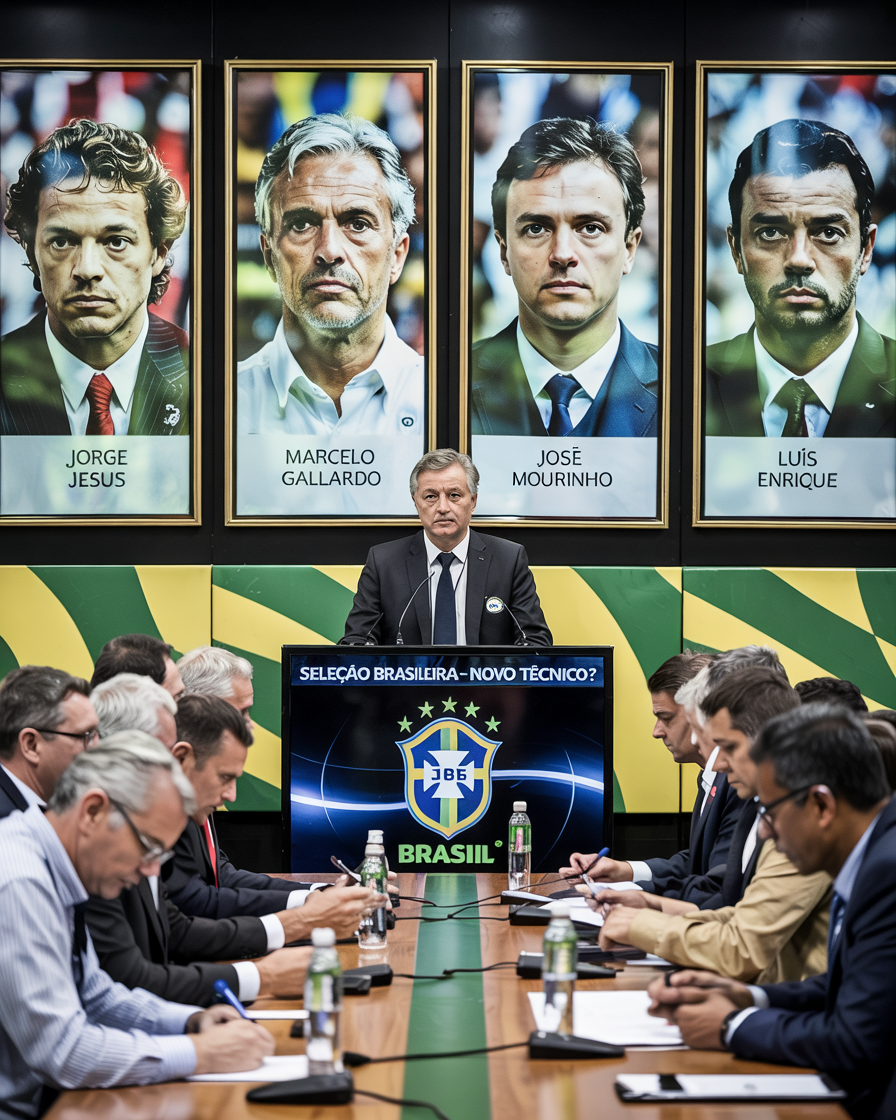Following the sudden resignation of Dorival Júnior as head coach of the Brazilian national football team, the Brazilian Football Confederation (CBF) has turned its attention abroad, evaluating four high-profile foreign managers to fill the vacant position.
The move signals a potential shift in strategy for Brazil — a country that has, for over a century, almost exclusively hired domestic coaches for its national team.
A New Era for the Seleção?
According to sources within the CBF and multiple sports outlets, the names being seriously considered include:
- Jorge Jesus (Portugal) – Former Flamengo coach who led the club to its historic treble in 2019 and is currently coaching in the Middle East.
- Marcelo Gallardo (Argentina) – Legendary former River Plate manager known for his tactical versatility and player development.
- Luis Enrique (Spain) – Ex-Barcelona and Spain national team coach, currently without a team after his run with Paris Saint-Germain.
- José Mourinho (Portugal) – The “Special One,” who recently parted ways with Roma, is reportedly interested in managing at international level.
This marks the first time since 1991, when Carlos Alberto Parreira consulted with foreign tacticians ahead of the USA ’94 campaign, that the CBF has publicly entertained foreign leadership as a primary option.
Why Consider a Foreign Manager Now?
Several factors have influenced the federation’s openness to hiring a non-Brazilian coach:
- Recent underperformance: Brazil’s disappointing results in the World Cup qualifiers and Copa América exits have led fans and officials to demand change.
- Tactical evolution: European and South American clubs have increasingly embraced flexible, possession-based systems — while Brazil has been criticized for relying too heavily on old formulas.
- Limited domestic options: With top Brazilian coaches currently tied to club contracts or recently dismissed from underperforming teams, the local talent pool is thin.
CBF officials believe that bringing in a coach with international pedigree could help modernize the Seleção’s tactical structure and reinvigorate its image ahead of the 2026 World Cup.
Public Reaction: Mixed but Curious
The possibility of a foreign coach has long divided opinion in Brazil. Traditionalists argue that only a Brazilian can truly understand the cultural and emotional nuances of managing the Seleção. Others believe the time for a bold change has come.
On social media, fans have shown surprising support for names like Jorge Jesus and Gallardo — both of whom have managed Brazilian players successfully and are familiar with the footballing environment in South America.
A recent fan poll by a leading sports channel showed:
- 38% favoring Jorge Jesus
- 26% backing Gallardo
- 20% curious about Mourinho
- 16% still wanting a Brazilian coach
The Challenge of Foreign Leadership
Hiring a foreign coach would not come without risks. Language barriers, cultural disconnects, and political dynamics within the CBF are potential obstacles. Additionally, foreign managers would need time to understand the unique rhythm of the Brazilian calendar and its impact on player availability.
However, these concerns are not insurmountable — especially with modern support teams, translators, and analyst networks available to smooth the transition.
What’s Next?
The CBF has announced that a decision will be made before the next international break in June, giving the new coach time to prepare for Copa América and resume World Cup qualification.
In the meantime, an interim technical commission led by Fernando Lázaro, a current federation staffer, is overseeing player assessments and training logistics.
Representatives from the CBF are expected to meet with at least two of the shortlisted foreign coaches in person during April, including potential visits to Europe and the Middle East.
Conclusion: Bold Move or Desperate Gamble?
Brazil’s interest in hiring a foreign coach may prove to be a defining moment in its footballing history. Whether it becomes a bold step forward or an unsuccessful experiment will depend on the federation’s clarity, the chosen coach’s adaptability, and — as always — the performance on the pitch.
But one thing is certain: the Seleção is no longer relying solely on tradition. It’s looking for transformation.
